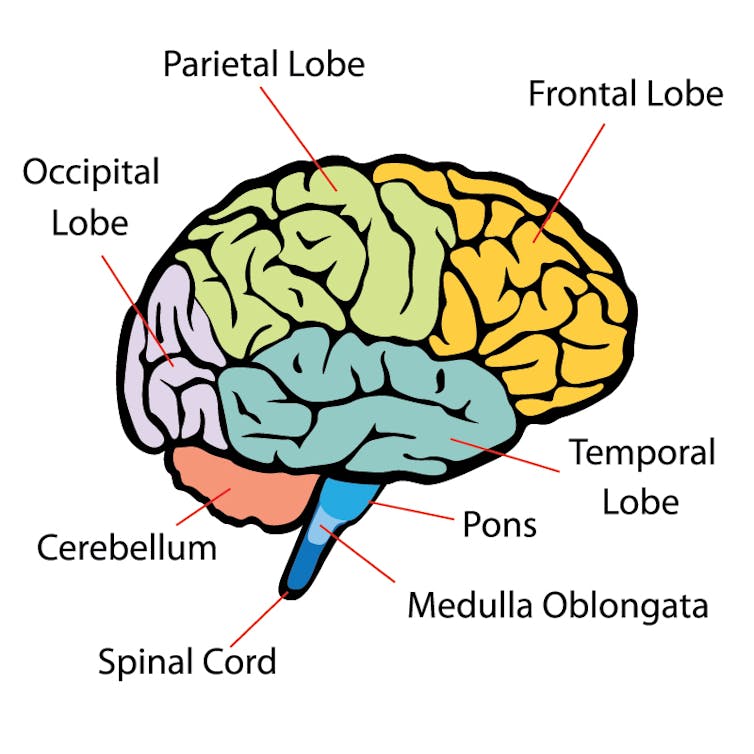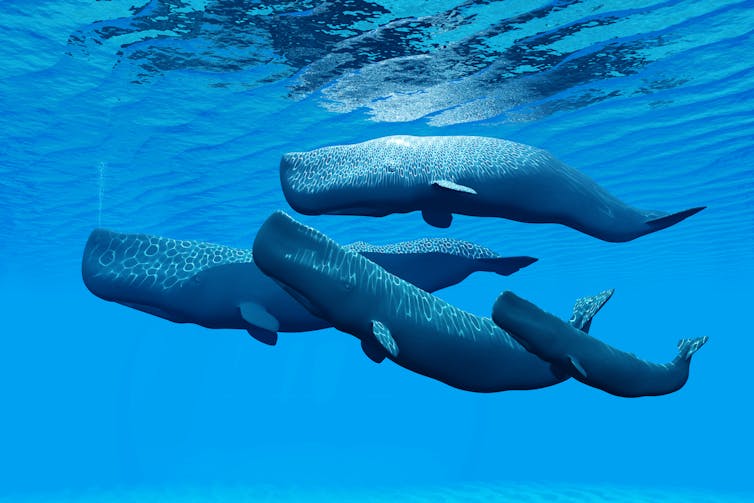how much does a brain weigh?
- Written by David Farmer, Senior Research Officer, Florey Institute of Neuroscience and Mental Health
Curious Kids is a series for children. If you have a question you’d like an expert to answer, send it to curiouskids@theconversation.edu.au You might also like the podcast Imagine This, a co-production between ABC KIDS listen and The Conversation, based on Curious Kids.
How much does a brain weigh? – Question from the students of Ms Young’s Grade 5/6 class, Baden Powell College, Victoria.
A newborn baby’s brain weighs about 400 grams – a bit lighter than half a litre of milk, or about the same as four medium-sized rainbow lorikeets. By the time that baby reaches her teens, her brain now weighs about 1.4 - 1.5 kilograms: one whole extra litre of milk or a whopping nine or 10 extra lorikeets!
And while a teenager’s brain is still learning and developing, it won’t get much bigger in size – an adult brain is about 1.4 - 1.5kg too.
That 1.5 kilograms takes up about 1300 millilitres, and is about 70% water. The remaining 30% is made up of fat and protein with a little bit of sugar and a little bit of salt.
This makes the brain sound quite similar to pancakes but the brain is much more useful for thinking and (as you might imagine) far less delicious than pancakes.
I don’t have to imagine how delicious brains are because I once tried eating some at a Teppanyaki restaurant in Japan. At least, I think that it was brain: it was listed on the menu as “meat of the head” and I think that it was chicken brain. At least, I hope that it was chicken brain. At the time, I wished that it was pancakes.
Delicious or not, these ingredients make up the 86 billion thinking cells (called “neurons”) and 80 billion or so supporting cells that, together, make up your brain.
This is a whole lot of cells; it is similar to the estimated number of stars in the Milky Way galaxy!
 Your brain has lots of different parts that all take care of different things, like memory, movement, feelings, imagination.
Shutterstock
Your brain has lots of different parts that all take care of different things, like memory, movement, feelings, imagination.
Shutterstock
Read more: Curious Kids: Why do our brains freak us out with scary dreams?
One of the smallest “brains” belongs to a microscopic worm, Caenorhabditis elegans. It only has 302 brain cells, each one with its own name.
The sperm whale, on the other hand, has a whopping big brain. The biggest brain on Earth, in fact. It is 8 litres: about the size of a small school backpack, or considerably more lorikeet parrots than you could fit into a small school backpack. But please, do not try this at home. Or anywhere else, for that matter.
 The biggest brain on Earth belongs to the sperm whale.
Shutterstock
The biggest brain on Earth belongs to the sperm whale.
Shutterstock
“But wait!” I hear you cry. “The blue whale is the biggest whale on Earth. Why doesn’t it have the biggest brain?!”.
Blue whales might be the biggest whales, but they don’t have the biggest brains. Unlike blue whales, sperm whales need to do complicated things like herding and hunting in order to survive.
These tricky tasks require more brain power than simple filter-feeding (which is what blue whales do), and that may be why sperm whales have bigger brains.
As for your brain, you can keep it healthy by eating healthy food (so, not pancakes… OK some pancakes), drinking lots of water, getting some exercise, thinking and using your imagination.
You can use your imagination to wonder what brains taste like or imagine how big your school bag would have to be to comfortably accommodate 64 lorikeets.
Above all, keep thinking up excellent questions about the world around you.
David Farmer is the brains (pun absolutely intended) behind the Melbourne Comedy Festival show “Why You’re Not Dead Yet” which is all about brain function.
Read more: Curious Kids: If Australia is at the bottom of the world, why are we the right way up?
Hello, curious kids! Have you got a question you’d like an expert to answer? Ask an adult to send your question to curiouskids@theconversation.edu.au
 CC BY-ND
Please tell us your name, age and which city you live in. We won’t be able to answer every question but we will do our best.
CC BY-ND
Please tell us your name, age and which city you live in. We won’t be able to answer every question but we will do our best.
Authors: David Farmer, Senior Research Officer, Florey Institute of Neuroscience and Mental Health
Read more http://theconversation.com/curious-kids-how-much-does-a-brain-weigh-112000




